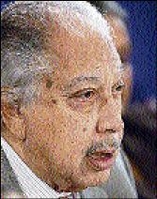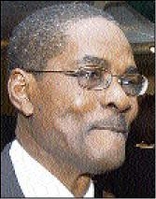
Phipps
'Wanted: A new court of appeal' was how The Gleaner published an article by E.C.L. Parkinson, a barrister, expressing his dissatisfaction with the administration of justice in 1950.
Almost 60 years later, another call for a new court of appeal is being made by David Coore, QC, in The Sunday Gleaner (October 18, 2009), repeating the call he says that was first made in 1988 for a Caribbean Court of Justice (CCJ). But in a long drawn-out dispute, in and out of court, there is no expression of dissatisfaction with the existing administration, nor is there a call for improving the conditions for the delivery of justice in Jamaica.
Justice Panton, the president of the Court of Appeal, while saying how overworked his judges are - with eight doing the work of 12 - strongly maintains his position as a committed advocate for his court to be the final court for Jamaica, with no further appeal to either the CCJ or the Privy Council.
It is difficult to support Justice Panton's position, as his overworked judges may not have the time to read the record of the cases they have to consider, or the time to give careful consideration to the points of law argued before them. The workload of the present Court of Appeal makes Mr Parkinson's contention in 1950 even more relevant today when he said, "If it is a criminal appeal, where the applicant is in custody, this means that the poor wretch has to cool his heals (sic) in prison for probably six months or more, waiting on his appeal to be heard".
FIRST THINGS FIRST


Coore (left) and Panton (right).
Justice Panton's statement about conditions at his court should serve to remind us of the United Nations' (UN) Basic Principles on the Independence of the Judiciary (resolutions 40/32 of 29 November 1985 and 40/146 of 13 December 1985):
Whereas it is, therefore, appropriate that consideration be first given to the role of judges in relation to the system of justice and to the importance of their selection, training and conduct,
7. It is the duty of each member state to provide adequate resources to enable the judiciary to properly perform its functions.
It is against the background of the UN statement that the proposal for replacing the Privy Council with the CCJ as the final court must be considered. Mr Coore identifies the history of the dispute as one between the two major political parties, with the proponents for change basing their arguments largely on claims of independence and a treaty for regional unity; and elsewhere, condemning their opponents as being either wealthy or wicked.
The advocates for change seem to give very little, or no, thought to the absolute necessity to put first things first for a reliable system of justice in independent Jamaica by providing adequate resources for the judiciary to perform its functions properly.
To implement this re-quirement before calling for change in the hier-archical arrangement for appeals would greatly reduce the need to go further.
NO COMMENT REQUIRED

Vasciannie
In the call for a change from the Privy Council to the CCJ, no mention is made of the consequences that may follow from Jamaica's withdrawal from the CCJ because of "perceived inconvenience". Withdrawal from member-ship at regional and international organisations is not unknown for Jamaica.
First, there was the withdrawal from the West Indies Federation in 1962, after only four years.
Likewise is the threat of withdrawal from the debate in Parliament for a Charter of Rights because of the Privy Council's inconvenient decision for hanging in the Pratt and Morgan case, when the present call is to get rid of the Privy Council. The withdrawal syndrome is an indication that Jamaica may one day wish to withdraw from a Caribbean Court of Justice when the decisions from that court are deemed not convenient for the current national aspirations.
This is a real danger for a stable judiciary where "the last stage will be worse than the first" when the country will revert to the Jamaican court as the final court without a further appeal, which very few want.
Mr Coore says that the Jamaica Labour Party's (JLP) grounds for objection to the change is "their contention that there should be an 'indicative referendum' beforehand to determine whether the Jamaican people wished the substitution to take place".
The People's National Party, on the other hand, suggested "the proper course would be to pass the legislation in Parliament, so the CCJ would then become included in the Constitution". Later, to have it entrenched in the Constitution "after it had been passed by Parliament, to be submitted to the electorate in a referendum for approval before it could become law [my emphases]".
In this chicken-or-egg question as to what comes first for seeking the wishes of the people in the dispute, again no consideration is given to the consequences that flow from the interim position when Parliament would have abolished the Privy Council, which is not entrenched, and an equally not entrenched CCJ is in existence.
This would be the situation before the people had decided, bearing in mind how long it will take for a referendum, or where the change to CCJ is rejected by the people at a referendum and withdrawal from the CCJ becomes necessary.
A third proposal is for the CCJ (which I understand we are already paying for) to be an intermediate court between Jamaica's Court of Appeal and the Privy Council.
It is unwise, it is argued, to give up a court that is tested and removed from considerations of political or other convenience, a court that has served Jamaica well, and to replace such a court instantaneously by a new untried court.
In 1950, E.C.L. Parkinson and The Gleaner paid the price for publishing dissatisfaction about the system of justice.
Roper's luck
A writer today expressing his dissatisfaction with the courts and the administration of justice may not have the same luck as the Rev Garnett Roper for his criticism of the Court of Appeal.
This advice is appropriate for the discussion about the Caribbean Court of Justice to replace the Privy Council, which is carried out almost entirely by good party men.
Frank Phipps is an attorney-at-law. Feedback may be sent to columns@gleanerjm.com.